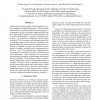Free Online Productivity Tools
i2Speak
i2Symbol
i2OCR
iTex2Img
iWeb2Print
iWeb2Shot
i2Type
iPdf2Split
iPdf2Merge
i2Bopomofo
i2Arabic
i2Style
i2Image
i2PDF
iLatex2Rtf
Sci2ools
ICANN
2001
Springer
2001
Springer
Independent Variable Group Analysis
Humans tend to group together related properties in order to understand complex phenomena. When modeling large problems with limited representational resources, it is important to be able to construct compact models of the data. Structuring the problem into sub-problems that can be modeled independently is a means for achieving compactness. We describe the Independent Variable Group Analysis (IVGA), an unsupervised learning principle that in modeling a data set, also discovers a grouping of the input variables that reflects statistical independencies in the data. In addition, we discuss its connection to some aspects of cognitive modeling and of representations in the brain. The IVGA approach and its implementation are designed to be practical, efficient, and useful for real world applications. Initial experiments on several data sets are reported to examine the performance and potential uses of the method. The preliminary results are promising: the method does seem to find indepen...
Related Content
| Added | 29 Jul 2010 |
| Updated | 29 Jul 2010 |
| Type | Conference |
| Year | 2001 |
| Where | ICANN |
| Authors | Krista Lagus, Esa Alhoniemi, Harri Valpola |
Comments (0)

